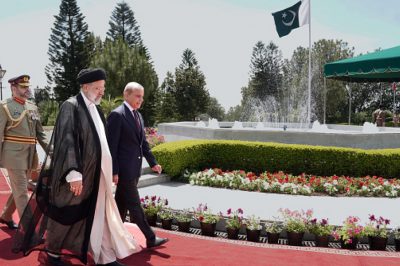On Monday, Pakistan expressed deep shock and sadness over the tragic news of the martyrdom of Iranian President Dr. Seyyed Ebrahim Raisi and Iranian Foreign Minister Hossein Amir-Abdollahian in a helicopter crash. The crash, which occurred near Jolfa close to the Azerbaijan border, resulted in the deaths of several key Iranian officials.
President Asif Ali Zardari and Prime Minister Shehbaz Sharif expressed profound grief over the tragic helicopter crash that claimed the lives of Iranian President Seyyed Ebrahim Raisi and Foreign Minister Hossein Amir-Abdollahian. They extended heartfelt condolences to the bereaved families. Zardari praised Raisi’s dedication to the Muslim Ummah and his support for global Muslim causes.
Sharif announced a National Day of Mourning, with flags at half-mast, honoring Raisi’s contributions to strengthening Pakistan-Iran ties. Deputy Prime Minister Ishaq Dar also expressed sorrow, acknowledging Raisi’s pivotal role in solidifying bilateral relations during his recent visit.
Pakistan’s Foreign Office Spokesperson, Mumtaz Zahra Baloch, extended heartfelt condolences to the bereaved families and the people and government of Iran. She emphasized Pakistan’s profound sorrow and grief, reiterating solidarity in this national tragedy.
Contributions of the Late Leaders
President Raisi and Foreign Minister Hossein Amir-Abdollahian were esteemed leaders whose contributions to Iran and the reinforcement of Iran-Pakistan relations will be remembered. Their visit to Pakistan in April 2024 led to essential understandings to solidify bilateral ties. These efforts focused on enhancing economic cooperation, combating terrorism, and addressing regional security challenges.
Economic Cooperation and Trade
President Raisi’s visit to Pakistan was pivotal in addressing the trade imbalance between the two countries. At a joint press conference with Pakistani Prime Minister Shehbaz Sharif, Raisi highlighted the need to increase the current trade volume from over $2 billion to $10 billion. This ambitious target reflects a mutual commitment to bolstering economic ties through enhanced trade, connectivity, energy, and agriculture. Raisi and Sharif’s inauguration of the first border market at the Mand-Pishin crossing in May 2023 marked a significant step towards improving economic relations. However, further action is needed to realize the market’s potential fully.
Political and Security Cooperation
During his visit, President Raisi emphasized the shared commitment of Iran and Pakistan to combat terrorism and organized crime. Both countries face threats from various militant groups, making their cooperation crucial for regional stability. Joint efforts to enhance security along their shared border are essential, especially following the escalation of border tensions in January 2024, when Iran conducted air attacks targeting militant bases, prompting a retaliatory missile strike from Pakistan.
Cultural and Religious Ties
Iran and Pakistan share deep cultural and religious bonds, which President Raisi highlighted during his visit. The two nations’ common faith and interconnected religious practices are a foundation for their relationship. Thousands of Shia pilgrims from Pakistan travel to Iran annually, underscoring the strong people-to-people connections. Both leaders recognized the importance of these cultural ties in fostering mutual understanding and cooperation.
Also Read: Tragic helicopter crash claims lives of Iranian President Ebrahim Raisi and Top Officials
Regional and International Dynamics
Raisi’s tenure involved navigating complex geopolitical dynamics, including the ongoing Israel-Hamas conflict and Iran’s nuclear program. His administration’s decision to launch a drone-and-missile attack on Israel, under Supreme Leader Ayatollah Ali Khamenei’s directive, highlighted the regional security challenges. Additionally, Iran’s uranium enrichment activities increased tensions with Western nations. Raisi’s visit to Pakistan came amid critical geopolitical tensions, with his administration seeking stability in Tehran’s foreign policy and regional relations. Raisi’s visit appeared to be an attempt to gain Islamabad’s support for its reprisal attack against Israel and demonstrate business as usual in Tehran’s foreign policy and regional relations.
Energy and Infrastructure Projects
Discussions during Raisi’s visit included critical infrastructure projects like the Iran-Pakistan gas pipeline. Despite external pressures, particularly from the United States, Raisi’s administration expressed determination to advance energy cooperation initiatives vital for Pakistan’s energy needs and regional economic integration. However, no significant breakthroughs were announced during the visit.
President Ebrahim Raisi’s tenure significantly impacted Iran-Pakistan relations, focusing on enhancing economic ties, security cooperation, and cultural connections. The tragic helicopter crash marked a significant loss for Iran, but the initiatives and agreements forged during his presidency are likely to shape the future trajectory of Iran-Pakistan relations. Continued collaboration will be crucial for the stability and prosperity of both nations in the coming years.
International Relations Scholar interested in National Security strategies, with a good focus on Geo-Politics, Foreign Policy, and Public & Cultural Diplomacy.







